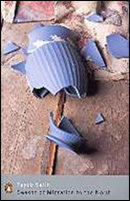 I borrow this satirical title, somewhat modified, from the title of Al-Tayyib Salih's novel "Season of Migration to the North", and from the words of colleague Mazen Mostafa, also a brilliant novelist, who once briefly visited the afterlife in Turkey.
I borrow this satirical title, somewhat modified, from the title of Al-Tayyib Salih's novel "Season of Migration to the North", and from the words of colleague Mazen Mostafa, also a brilliant novelist, who once briefly visited the afterlife in Turkey.
Death is a season when it befalls friends. That is how we imagine it. We do not like it to dwell amongst us. It is a season that ends, and moves from place to place. It sets here to rise there. We fool ourselves into thinking it has gone away. We lie, and return to our busy lives. What is least tragic is most ironic.
In the past two years, death has been frequent among friends. Its season has lasted longer than we have ever known: Mai Ghossoub, Joseph Samaha, Mahmoud Darwish, Bassam Hajjar, Al-Tayyib Salih, Saleh Bashir, Qassem Jaafar, and others. All of them friends, so there is no place for the philosophy of death. Its philosophy fluctuates. It is fine when it is far away, but when it is this close, then sarcasm is better. Some of us say that it (the season) draws near. They ask how old the deceased was (there is none uglier than the expression "he was this old when he died"). They make an involuntary inventory, comparing it to their own age. They secretly smile if they are younger, and feel sad if they are older. Memories take them to their farthest reaches. Death opens wide the gates of memory. It drives us to tell the stories we know about our friends. We tell our story, not theirs. We tell it to make sure that we are still alive, that absence is not present. But everything we do, from enjoying our cup of coffee in the morning, to being engrossed in work, to political debates and discussions, to fleeting rivalries, to leisure, to writing, is nothing but an escape from the thought. By dint of repetition and persistence, escape has become a self-fuelled mechanism, one which stops working without warning, or with a painful one.
We recall Al-Tayyib's sarcasm. In his novel "Season of Migration to the North", he tells the story of Mustafa Sa'eed, moving from Sudan to London, to Copenhagen and India, then back to Sudan, where he gets married and settles down, to rest from the clamor and escape from his girlfriends. Yet, ironically, during one flood he is swallowed up by the Nile. Al-Tayyib writes the following self-evident lines: "Thousands of people die every day. Were we to pause and consider why each of them died, and how - what would happen to us, the living? The world goes on whether we choose for it to do so or in defiance of us. And I, like millions of mankind, walk and move, generally by force of habit, in a long caravan that ascends and descends, encamps, and then proceeds on its way. Life in this caravan is not altogether bad. You no doubt are aware of this. The going may be hard by day, the wilderness sweeping out before us like shoreless seas; we pour with sweat, our throats are parched with thirst, and we reach the frontier beyond which we think we cannot go. Then the sun sets, the air grows cool, and millions of stars twinkle in the sky…"
Death is always present and sarcasm is always ready. To quote Woody Allen, "I am not afraid of death; I just don't want to be there when it happens".
Al-Hayat
22/02/09